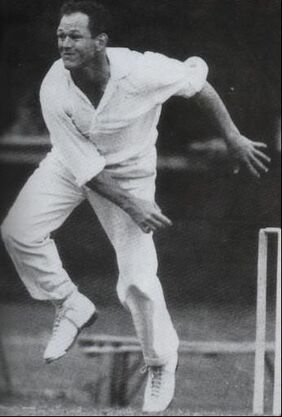|
Cricketer Ken Palmer Bill Cooper June 2020 As an ex-player and scorer, I was intrigued by Clive Banks’ article about the 150-year anniversary of the Box Cricket Club. I can possibly fill in a few gaps in Clive’s article as I was keeping the club's score card after the war when his dad, Sid Banks, was around but only playing occasionally. To continue Clive's exploits of facing a quickie (fast bowler), here is an experience of mine about a marvellous player, Ken Palmer, cricketer and cricket umpire for many years. Right: Ken Palmer in action bowling (courtesy Somerset Cricket Club) |
In the summer of either 1952 or 1953 I was batting in a game at Devizes which was slowly heading towards a tame draw after a rain-interrupted day. Suddenly the word went around: Let Young Ken finish up! Young Ken was a marvellous player, an all-rounder who could bat and bowl well. He later went on to become a professional cricketer for Somerset. He was then under scrutiny for the county and at that time had something to prove. Wow, did he bowl fast!! I did survive and, thankfully, rain intervened and we adjourned the game to enjoy Devizes’ famous hospitality. In Don Bradfield's book, A Century of Box Cricket Club, he mentions Ken Palmer stepping out of the old pavilion onto The Rec in 1952 or 1953 to bat against Box, scoring 18 runs. By 1960 Ken achieved the double of scoring 1,000 runs for Somerset and taking 100 wickets in the same season.
Ken Palmer was only a fifteen-year-old teenager when I played him and he went on to play county cricket from 1955 until 1969. He played one Test match for England in South Africa, by default stepping in because of the injury of others. He was also twelfth man (first reserve) twice in the West Indies. After his playing career ended, he was England's longest serving umpire and awarded the MBE in 2003 for services to cricket. What a record.
Ken Palmer was only a fifteen-year-old teenager when I played him and he went on to play county cricket from 1955 until 1969. He played one Test match for England in South Africa, by default stepping in because of the injury of others. He was also twelfth man (first reserve) twice in the West Indies. After his playing career ended, he was England's longest serving umpire and awarded the MBE in 2003 for services to cricket. What a record.
